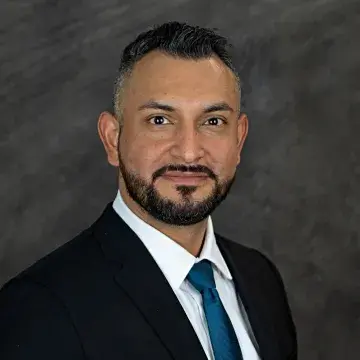From the Classroom to the Courtroom

Miguel Garcia, RWU Law Class of 2024
Juris DoctorAs it did for many, the COVID 19 pandemic led Miguel Garcia ’24 to reevaluate his life and career path. Garcia had spent the better part of the last decade teaching in his native southern Texas and satisfying his love for global travel. When COVID hit, he was in Egypt—and in Egypt he was forced to stay for several months due to lockdowns. While he could still teach remotely, he found himself increasingly disheartened by the lack of face-to-face time with his students—which was the thing he loved most about his work.
“For me, my job was more than just delivering content and grading papers,” says Garcia. “It’s about personal interaction with my students; it’s about mentorship.”
He decided that, as soon as he was able to return home, he would not be returning to his old teaching job. Determining what he would do instead ultimately took a bit more time, travel, and personal exploration.
When the borders reopened, Garcia went to Mexico to spend time with extended family. While there, he began working with Misión Mexico, an NGO in Tapachula that focuses on breaking cycles of poverty, abuse, and inequity by providing opportunity and education to area children. During his time in Tapachula, he got clearer picture of the social and political realities in Mexico, and discovered that the area has one of the highest rates of immigration enforcement in Mexico, with detention centers much like those making headlines in the southern United States.
Garcia realized that, in addition to struggling with poverty and other serious challenges, the people he worked with had no awareness of their rights. He instinctively fell back into teaching and mentoring mode; but it eventually dawned on him that the best way for him to advocate for his community was no longer in a classroom—but rather, in a courtroom.
“I understood that this teaching and mentoring role I was in was really just about advising people, trying to help them through their struggles,” Garcia said. “It became clear to me that I could serve the community far better in an advocacy role. And that’s when I realized that becoming a lawyer was the best course of action for me.”
But how did a Texas native working for a Mexican NGO wind up at a law school in Rhode Island? Well, Garcia had applied to law schools across the United States, but something about Roger Williams University Law School caught his attention.
Says Garcia, “I was initially drawn to RWU Law’s commitment to social justice. I admired how forward thinking the school was; and how willing, as a community, to ask hard questions about difficult issues and start to remedy them.. This approach permeated everything I read about the school, from its required course on race to its progressive philosophy. It was clear that RWU Law stood for something—it wasn’t just about giving students a degree in law. This approach is more about equitable solutions; understanding our role in law is to go beyond simply applying it. It’s about making sure that the law is right.”
As a student, Garcia’s view of the situation has grown increasingly nuanced.
“At RWU law, I’ve learned we need to learn the language and tools of the court to argue successfully for good outcomes,” he said. “However, if the law is not on our side, it is our responsibility to argue for change in the laws from our legislatures.”
Throughout his transition to law school, the teacher mentality in Garcia has remained a constant. Since coming to RWU Law, he has supplemented his core classes with experiential opportunities that champion causes close to his heart—and put him back into role of educator—including the law school’s Street Law and the ABA’s ProBAR Children’s program, which provides pro bono legal services to unaccompanied minors detained in the Rio Grande Valley. Over the summer following his 1L year, he took summer classes in order to make room in his schedule to take advantage of the Semester-in-Practice program.
“I really want to go to DC and learn about policy, and how to effect policy,” says Garcia. He explains that the future path for him is in the area of immigration; in particular, advocating for immigrant rights. But he knows that going down this path will take more than a mere desire to do good.
“I had a professor this year who told us ‘You are not in justice school; you are in law school. Sometimes the law is just and sometimes it’s not. And you need to come to terms with that.’ I realized that was such an important distinction. Right now, we are applying law, not creating law.”
But while Garcia understands that reality, he hopes that his law school education and experience will someday put him in a position to influence those who are making the laws—or perhaps even make laws himself. And he is determined to ensure that those laws are just.
